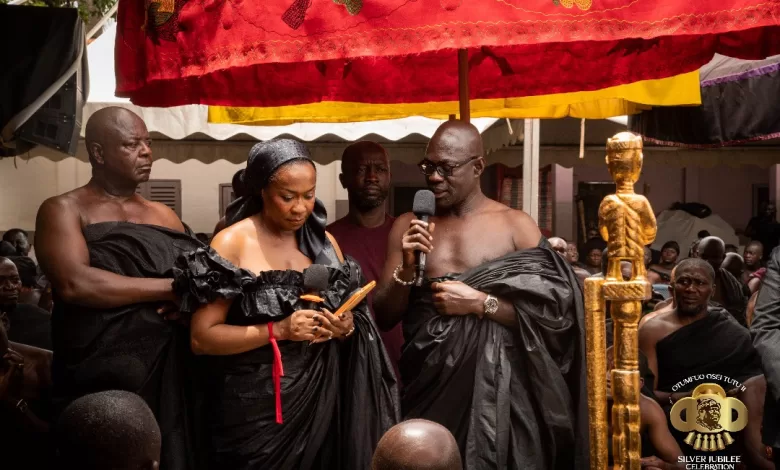Baoule Chiefs Inform Otumfuo About Death of Ex-Ivorian Prez

The leadership of the Baoule ethnic group- an Asante tribe in Ivory Coast- and the family of former President Henri Konan Bédié have officially broken the news of his demise to the King of the Asante Kingdom, Otumfuo Osei Tutu II.
This was on April 8, 2024, at the Manhyia Palace.
Among the delegation were seven Paramount chiefs including Nanan Attoh Yapi III, Nanan Komenan Jacob, Nanan Tano Kouakou, Nanan N’Guessan Toto, Nanan N’Guessan Begbin and Nanan N’Dri Kouakou Chamel.
It also included six family members of the former President comprising two of H.E. Bedie’s children, two nieces and two members of his extended family.
It as well had the former Minister of Foreign Affairs, Kakou Gervais and Member of Parliament of Sakassou, Hon Mansa Ndia who is a member of the Royal family.
Speaking on behalf of the delegation and as translated by Hon Mansa Ndia, Nanan Attoh Yapi III officially informed Otumfuo about the demise of the former President which occurred on August 2, 2023, and suggested a date for his funeral to the King.
“President Bedie was taken ill some time ago and despite efforts to treat him, he couldn’t make it and passed on. He was the son of Otumfuo and so we had to come here and make it known to him. Additionally we recognize Otumfuo as our Supreme head. Here we stand representing the eight million members of the tribe.”
They also sought the permission of the Occupant of the Golden Stool to go to Togo and make known the sad news to a remnant of their siblings who settled there after they migrated from Ghana years back.
The funeral of the H.E. Bedie will take place from May 19 to June 2, 2024.
Giving a nod to the suggested date, His Majesty promised the group of his assistance and reminded them of their true home.
H.E. Bedie was President of Côte d’Ivoire from 1993 to 1999. He died at 89 years.
The Baoule group, the largest ethnic group in Ivory Coast, is a descendant of Abena Pokuaa, a royal of the Oyoko Adakɔ Abusua of Nsuta who led her court to migrate and settle in their present-day home in 1720 after an internal wrangling over the successor to Osei Tutu.
Source: Manhyia Palace





